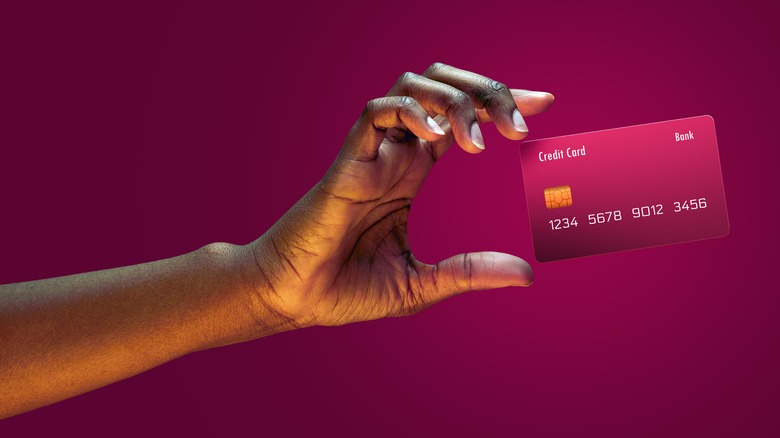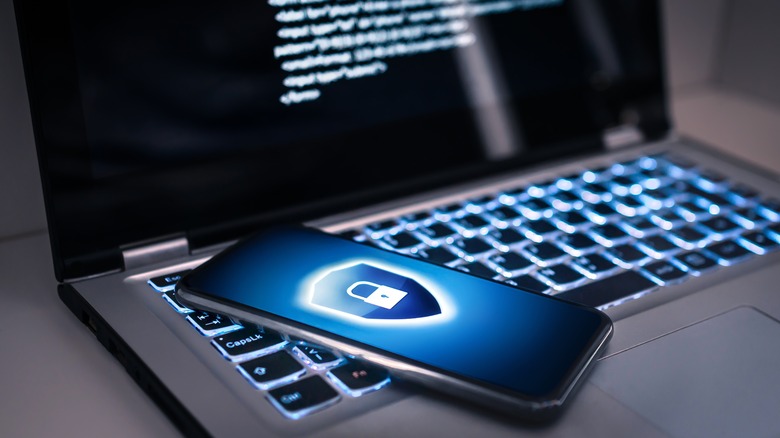The 10 Easiest Ways To Raise Your Credit Score
Your credit score affects many things in life, such as where you can live and the terms of big loans. If you've racked up balances because of higher education, a health emergency, moving, or, yes, buying too many nice things (that make you look fantastic, by the way), rebuilding credit can be a daunting task.
Understanding which balances to pay down or which accounts to have isn't always straightforward. Certainly, you should pay off your credit card balance — always pay off revolving balances if looking to boost a credit score. But, most aren't flush with the extra cash needed to pay down their debt accounts.
We're not here to tell you to stop buying a daily latte or skip the avocado toast — that rhetoric is largely unhelpful and shames people in debt. Instead, we embrace simple ways to raise your credit score for new or existing borrowers that don't require Scrooge McDuck levels of pocket change. The following simple steps will help you decide the right way to raise your credit score.
Avoid closing any accounts or opening (too many) new ones
Lending accounts with a long history will positively affect your credit score, FICO notes. A FICO Score, which is one of the most used credit rating systems, includes the average length of your oldest and newest credit accounts as part of a healthy credit score (credit history comprises 15% of the three-digit number).
Think of it like a doctor or a driver of a car: You want each to demonstrate as much experience as possible in their respective fields. A borrower who maintains a low balance and pays the bill on time for a decade versus one year demonstrates more stability and confidence they'll make better choices. This is why you don't want to close old credit cards, even if you aren't using them, since the length of credit history depends on how long you leave the credit card open. Keep in mind, while it helps to keep older revolving lines of credit (and periodically use them to avoid the account closing due to inactivity), your credit history average also considers new lines of credit.
FICO also recommends that you avoid opening several credit cards in a short period because this will count as multiple hard inquiries, which will bring down your score in more ways than one. The credit bureaus don't offer a hard rule on new accounts, but it's best not to open any new cards if you want to raise your overall score in the short term.
Maintain below 30% of total available balance on each card
What if you don't pay back what you borrowed on a credit card within your interest-free period? If you roll over balances to the next month (then the next and the next), your credit rating will reflect this: Avoid carrying more than 30% of your overall limit on any specific card, a term called a high credit utilization rate. Carrying a balance doesn't mean you scream "high risk," according to FICO. The rating system surveyed borrowers with a perfect 850 credit score: The average balance reported was around $13,000, but credit utilization was a low 4.1%. Translation: General debt won't hurt your score if it's a small percentage of what's available to you.
TransUnion recommends maintaining your balance as close to 0% as possible because that indicates to lenders a greater ability to pay debt quickly. Lenders make money off the interest but don't want to risk footing the entire bill. If you've experienced an unexpected event or out-of-control spending, paying off the high balance might take time. High credit utilization can also accumulate if you've transferred an existing balance to a 0% interest card, allowing you to pay purchases in increments. Still, aim to use only 30% of your total balance on each account.
Own cards you never use? FICO finds occasional spending, or a low utilization rate, might positively impact your FICO Score more than if that card collects dust — even if you pay off balances to avoid interest.
Build a credit mix if you have little credit
Having too little of a credit history can work against you. Although you don't want to open a credit or loan unnecessarily — no really, only apply for accounts you can use and pay back — the likelihood of a higher credit score depends on a healthy credit mix, called depth of credit by VantageScore. A credit mix, as defined by FICO, involves a revolving line of credit and an installment account with fixed payments over time. This could mean at least two credit cards, such as one card as a back-up option to avoid carrying over 30% or to earn rewards, and one installment account, such as a student, car, or personal loan.
One additional credit inquiry will take less than five points off a FICO Score and factor into only 10% of your overall score, according to the rating system. Recent credit behavior is only 5% of a VantageScore. A clean slate with a new account for low credit utilization, or a promotional 0% interest rate to pay down high-interest balances faster, can improve your credit score in the long run, especially if it lowers your overall credit utilization below 30% thanks to a balance transfer.
If your score is above average, and you're attempting to raise your credit score before applying for a car or home loan, it's best to skip this step since a new account could lower your score in the short term.
Pay down a small bill on a credit card to 0% monthly
This tactic might be the only true short(er)-term hack to boosting a credit score — but it still might take a few months. Tiffany Aliche, otherwise known as The Budgetnista offers a simple tip for raising your credit score: Set up automatic payments for one of your small monthly bills on a credit card without a balance. We recommend choose your Netflix or phone bill that you'd be paying anyway. Then, Aliche recommends setting another automatic payment from your bank to bring that balance to $0 every month.
This simple set-and-forget method capitalizes on the bureaus including low credit utilization as a sign of a stellar repayment history — and it doesn't matter if you're only paying off Netfix or the $2.99 charged for your Apple cloud subscription. Keep in mind: You shouldn't use this card for anything else (stick it in a drawer or cut it up), and the auto-pay is so you avoid ever missing a payment. Granted, this will only help if you continue to pay all your bills on time and reduce other revolving balances. Still, this is an easy hack to help increase your credit score with minimal effort.
Mix the avalanche and snowball methods
Your revolving credit accounts (like credit cards) factor more heavily into your credit scores, FICO notes. That's because they impact your credit utilization ratio, which is a major scoring factor in both the FICO and VantageScore scoring models. The remaining balances on your installment loans also impact your credit, but paying down those balances has less immediate impact on your score.
The Budgetnista recommends using a mix of the snowball and avalanche method if you have multiple credit cards with revolving debt: Pay off the lowest amount first (this will free up an account to auto-pay a small bill monthly). Once you've cleared one or two small accounts (and taken a minute to bask your progress), direct your monthly budget for debt toward paying off the card with the highest interest rate (which only racks up more debt with each passing month thanks to compound interest, which adds interest onto your interest every billing cycle).
We recommend using a free budgeting app like Mint to set goals and pay down the highest interest rates. The Mint credit card payoff tracker helps you set a monthly goal and divides that amount between multiple accounts starting with the highest interest rates first. You'll also appreciate the calculator to see how every extra dollar toward your debt payments will pay down your total that much faster.
Apply for a secured credit card
Paying bills on time is 35% of your credit score, FICO notes. Building a solid credit history can feel like a chicken or egg situation: If you have low or no credit, how do you show you pay bills on time when you can't get a revolving line of credit? Secured credit cards require putting your own money as a refundable deposit to guarantee card purchases. The Budgetnista explains a secured card allows you to use up to the amount of your deposit as a line of credit — you can spend up to $200 if your deposit is $200 — and then pay off the bill each month to demonstrate responsible spending. Over time, she explains your deposit is returned, and you can ask to upgrade to a regular credit card.
Banks are more likely to approve new borrowers or people with poor credit for a secured card because if you don't pay your bill, the bank will keep the deposit and won't be at a loss. But, paying off the balance each month will help increase your credit score with each monthly payment.
Retail cards might be easier to gain approval for despite a low credit score, but often result in much higher interest rates. Use with caution: If you're denied, it still counts as a hard inquiry against your credit score.
Consider a loan to pay off high-interest, rotating debt
If your debt is unmanageable and you're worried about missing payments, then consider the pros and cons of taking out a personal loan to consolidate high-interest balances. You might be thinking, won't a new account ding my score? While inquiries on a new line of credit often play a part in your credit score, they only make up 10% of your FICO Score and 5% of your VantageScore. The amount you owe and missed payments are much more harmful to your score, based on how credit scores are calculated. A lower interest rate will help you pay down your overall debt burden faster because compound interest works for you or against you.
Most credit scores are not affected by multiple inquiries from auto, mortgage, or student loans within a short period of time because credit agencies understand borrowers shop around for the best interest rate on a long-term, fixed payment, FICO notes. Unless you currently possess an average score and are trying to boost your digits to apply for a loan, you shouldn't worry about a small ding for the overall benefits of consolidation to a much lower interest rate.
Set up auto-pay to never miss a bill
If you carry a balance on a credit card, have student loans, or owe a car payment, you should never miss paying the monthly minimum. Paying your bills on time is the single most important factor in how a credit score is calculated: 35% of your FICO Score and a whopping 40% of your VantageScore is based on your payment history.
Sometimes it's tricky to keep track of due dates for utility bills versus credit card payments and don't forget about that mortgage or student loan (or both). While one late payment won't necessarily cause your landlord to kick you out or an electric company to shut off your lights, a missed payment for a credit card or loan can have lasting impacts on your credit report. Equifax is one of the three major credit bureaus that includes late payments on your report for up to seven years. The bureau will still record the delinquency on your account even after it's paid. Equifax explains it also works this way for bills that head to collections, bankruptcies, and repossessions.
Set up auto-pay for a credit card or loan for a day or two after you're paid. Not paid on a regular bi-weekly or monthly basis? Make a checking or savings account (ideally, one where you can build interest) to anticipate bills with fixed amounts and transfer money into the account as soon as freelance or project-based payments are received.
Check your credit score for errors with a free annual report
You can't know how to best increase your credit score if you don't know where you're starting. The good news, as the Consumer Finance Protection Bureau notes, is that checking your credit report won't hurt your credit score.
Even if you know your credit score, the government-supported annualcreditreport.com is where you can request a full run-down of your credit history. The report will break down any factors such as lingering bills sent to collections, late payments, and if an account is reporting to a bureau. Request and compare reports from all three of the major bureaus: Equifax, Experian, and TransUnion.
You should check your credit reports for mistakes, such as accounts you never opened or the wrong person's activity being listed on your account — it could mean fraud. The CFPD explains you have a right to request your report if you're denied a credit card, loan, or even employment based on your credit history. The more you know, the better.
Protect your credit score from fraud
Especially once you start to increase your credit score, you need to protect yourself from fraud. If you suspect fraudulent activity, freeze your credit at all three credit bureaus to protect against damaging events that can tie up your credit and take lots of time to remove. The process is free and can be undone both for a temporary period, if you want to apply for a new account, or permanently. Her Money reports that frozen credit stops criminals from identity theft, where they could charge a multitude of purchases and open accounts without your knowledge.
This is quite simple to do, takes minutes to complete, and allows borrowers like you a safeguard against vital information being sold to and used by nefarious characters. CNBC estimates the process will take 10 minutes per bureau and reassures that any banks you have a current financial relationship with will still be able to access your information as needed. The new site also doesn't recommend lifting a freeze longer than it is needed to apply for a new account in order to protect against future widescale breaches. After all, cyber attacks aren't going anywhere, so best to make sure your social security number doesn't land in the wrong hands.
Negotiate with creditors to reduce what you owe
Outstanding bills are sent to collections and can plague your credit for years. You can negotiate with creditors over everything from hospital bills, interest rates, and late fees. If you're struggling with a medical bill, Experian says to call the hospital to ask for the itemized charges to review for any errors or non-approved costs. Federal student loans offer a range of repayment plans based on income.
You can also call a credit card company or bank to request late fees be removed. Our experience is this works for one or two missed payments per year, as long as you typically pay on time. Responsible borrowers can also request lower interest rates on a credit card. The bureau also finds you can move a loan into forbearance, allowing a break from monthly payments for a period of time, even though you still accrue interest.
U.S. News finds you can also negotiate with debt collectors, recommending that you avoid admitting you owe anything to a collector during the first call (it could legitimize the debt or extend the statute of limitations) and never give personal information over the phone. Also, most debt collectors won't expect the full amount of the original bill — the average collection agency buys debt for literal pennies on the dollar — so be prepared to offer less. Of course, it might take some time, and it's best to avoid the hit to your credit in the first place.











